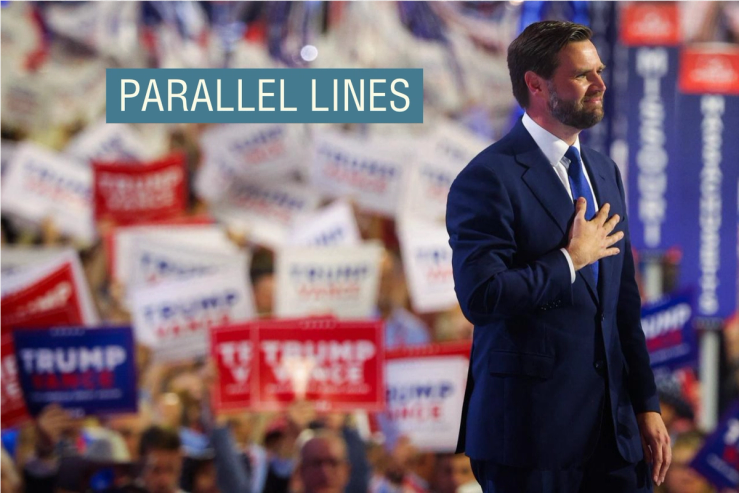The News
Say this for JD Vance: He’s a boon to think pieces. By picking a populist intellectual leader with a clear route to the 2028 nomination, Donald Trump has raised questions about the future of the American right and the Republican party that we’ll spend years unpacking even if Democrats hold the White House.
But there’s another way of looking at Vance’s place in the Trump era besides his ideological bona fides: He’s a MAGA mirror image of the former president’s nemesis, Barack Obama.
In this article:
Benjy’s view
Vance had plenty of strong supporters in Trump’s inner circle pushing for his selection, from Don Jr. to Tucker Carlson (who even reportedly warned that a “neocon” pick would open Trump up to deep state assassins).
But the parallels to a certain political figure at a similar point in his career are so clear that I wonder if, even subconsciously, the final pick was made with him in mind.
Like Obama after his 2004 star turn, Vance was known by his personal story more than any political stance or personal accomplishments — for his rise from humble roots and a difficult family situation to the top of elite institutions. Each wrote memoirs (though only Vance’s was a pre-politics bestseller) about their experience and both became celebrated for their ability to communicate across different political and social worlds, in which they could operate as insiders and outsiders. Obama used his diverse family and international upbringing to celebrate American pluralism and question the red state/blue state divides of the time. Vance became famous for communicating the struggles of conservative Appalachia to liberal America. Each had a public service streak in line with his party: Obama as a community organizer, Vance in the military.
But what really made me think of the connection was a detail in Trump’s announcement of his pick praising Vance (somewhat misleadingly) as “Editor of the Yale Law Journal.” Obama, famously, was the first Black president of the Harvard Law Review.
Trump loves pointing to the academic credentials of both himself and his picks for top jobs; it’s a quirk of his otherwise anti-elitist message. Just as he raves over the quality of the marble in Trump Tower being the best of the best, he’s not shy about saying he wants the same in degrees as well.
That impulse has come up in a darker context, though, one that also connects Obama and Vance.
To understand the connection, we have to go back to Trump’s extended “birther” period, his modern political origin story. During this time, he rose to new prominence on the right by championing a conspiracy theory that falsely suggested Obama was not born in America. It peaked in 2011 when Obama released his long-form birth certificate in response and mocked Trump afterwards at the White House Correspondents Dinner.
The “birther” theory was widely derided as racist and xenophobic, portraying the first Black president as a foreign usurper and tying into other phony claims (also egged on by Trump) suggesting he was secretly Muslim. But Trump’s personal interest in the “birther” issue with Obama was slightly different from others, who typically treated it as a longshot way to overturn his election. More than anything else, he was obsessed with the notion that Obama owed his achievements to affirmative action, rather than his hard work and intellect. He even claimed he didn’t write his book.
His white whale was proving that Obama had — even falsely — said he been born in Kenya or Indonesia in order to boost his applications to Columbia and Harvard. “If you were born in Kenya, you got into colleges, and you got aid,” he told reporters.
This work continued years after broader interest in Obama’s birth certificate had faded, even on the right. On the eve of the 2012 election, Trump offered to give $5 million to charity in exchange for Obama’s college and passport records. In 2014, he held a press conference to up the offer to $50 million. When he began running for president in 2015, and facing questions about his “birther” talk, he was still talking about his college records on shows like Meet The Press.
And now, almost ten years later, he has settled on a candidate known for railing against claims of “white privilege” all while campaigning on his own narrative and identity, a corresponding up-by-the-bootstraps story of academic success, altruistic service, and literary acclaim. I’m not sure even Trump himself has made the connection, but it’s hard to miss.
Notable
- Semafor’s David Weigel reported on Vance’s prime-time speech from inside the convention hall. He was focused on how he used his biography to smooth over some of the deeper divisions in the party at the moment, some of which are centered around his candidacy.


